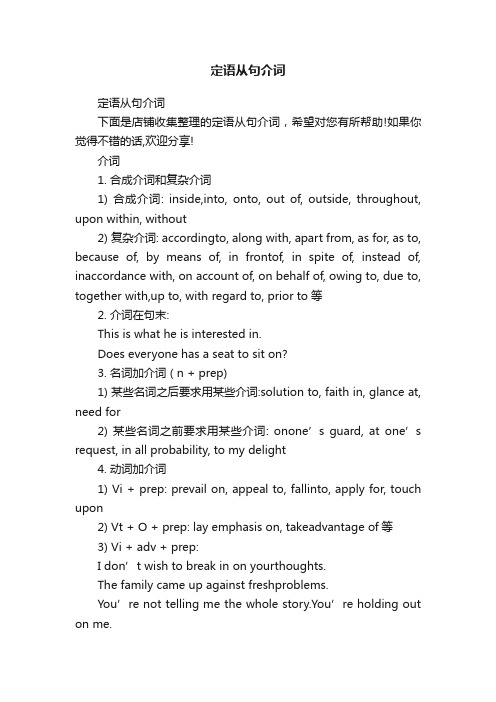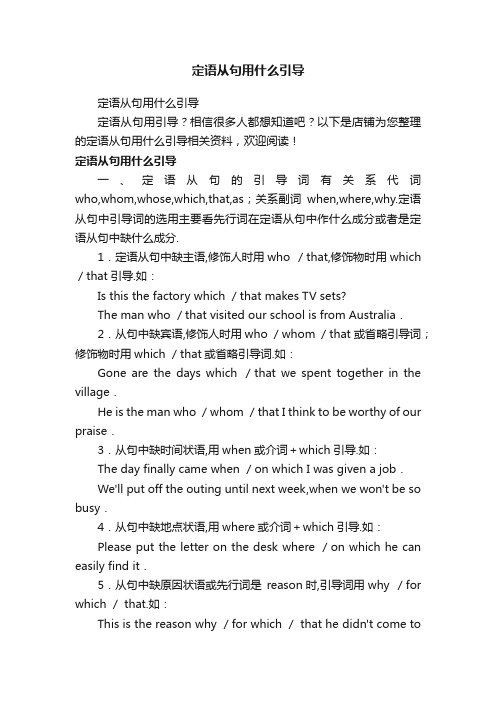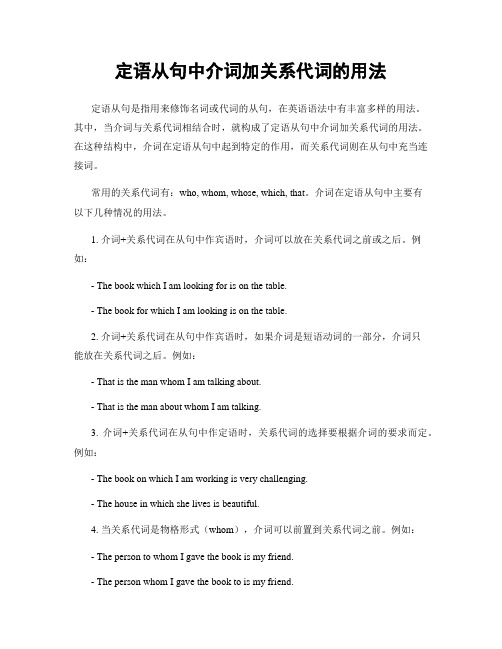定语从句的介词
定语从句介词知识点总结

定语从句介词知识点总结介词在定语从句中的使用分为两种情况:一种是介词前置,即介词位于定语从句中引导词的前面;另一种是介词后置,即介词位于定语从句中引导词的后面。
在具体的语境中,要根据不同的情况选择恰当的介词,并确保介词的使用符合语法规则。
一、介词前置情况1. 时间介词的前置在定语从句中,表示时间的介词如at, on, in等通常放在从句的先导词之前。
例如:The day when we met for the first time is still vivid in my memory.(我们第一次见面的那一天在我的记忆中依然清晰)I will never forget the moment when I held my baby for the first time.(我永远不会忘记我第一次抱着我的宝宝的那一刻)2. 原因介词的前置表示原因的介词如because of, due to等也通常放在定语从句中引导词的前面。
例如:The reason why she didn't come to the party is because of her illness.(她没来参加派对的原因是因为生病了)The failure of the project was due to the lack of funding.(这个项目的失败是因为资金不足)3. 地点介词的前置在表示地点的定语从句中,介词如in, at, on等也通常放在引导词的前面。
例如:The place where we met for the first time is now a bustling shopping mall.(我们第一次见面的地方现在成了一个繁华的购物中心)I will never forget the city where I spent my childhood.(我永远不会忘记我度过童年的那座城市)4. 其他介词的前置除了表示时间、原因、地点的介词外,其他表示方式、比较、程度等概念的介词也通常放在定语从句中引导词的前面。
定语从句中的介词可提前的全部情况

定语从句中的介词可提前的全部情况关系代词whom或which在定语从句中作介词宾语时,介词可放在后面,也可提前构成介词+关系代词whom (先行词指人)/which(先行词指物)引导定语从句(这种方法更为正式)。
例: Mary is the girl whom I borrowed a book from. = Mary is the girl from whom I borrowed a book. 玛丽就是我向她借书的那个女孩。
Is this the room that/which he once lived in? = Is this the room in which he once lived? 这是他曾经住过的房子吗?常见的有以下几种情况:1. where=in/on which 例:This is the room where / in which he lives.这是他住的房间。
I can see the playground where / on which they do sports.我能看见他们进行运动的操场。
2. when= on/in/at which 例:I still remember the year when/ in which I joined the Party.我仍然记得入党的那一年。
I still remember the day when/on which I joined the Party. 我仍然记得入党的那一天。
I still remember the hour when/at which the rocket was launched.我仍然记得那个火箭发射的时刻。
3. why=for which 例:This is the reason why / for which he was killed.这是他被杀害的原因。
但下列情况下介词不能提前:⑴用who代替whom,用that代替which时,介词不能提前。
定语从句介词加关系代词用法

定语从句介词加关系代词用法在定语从句中,介词加关系代词的用法如下:1.关系代词在介词前:当关系代词作为定语从句的主语时,介词通常放在关系代词的前面。
例如:- The man whom I spoke to is my boss.(我与之交谈的那个人是我的老板。
)- The book that I am looking for is on the table.(我要找的那本书在桌子上。
)2.关系代词在介词后:当关系代词作为定语从句的宾语时,介词通常放在关系代词的后面。
例如:- The house which he lives in is very old.(他住在的那栋房子很旧。
)- The car that she is interested in is not available.(她感兴趣的那辆车不可用。
)需要注意的是,当介词后的关系代词是which时,可以省略介词。
例如:- The city which I was born in is famous for its architecture.(我出生的那座城市以其建筑而闻名。
)- The city I was born in is famous for its architecture.(我出生的那座城市以其建筑而闻名。
)同时,也可以通过适当拓展定语从句来提供更多信息:- The man whom I spoke to yesterday, in the cafe near my office, is my boss.(昨天我在我办公室附近的咖啡馆里与之交谈的那个人是我的老板。
)- The book that I am looking for, which is a bestseller,is on the table.(我正在找的那本畅销书就在桌子上。
)。
定语从句介词

定语从句介词定语从句介词下面是店铺收集整理的定语从句介词,希望对您有所帮助!如果你觉得不错的话,欢迎分享!介词1. 合成介词和复杂介词1) 合成介词: inside,into, onto, out of, outside, throughout, upon within, without2) 复杂介词: accordingto, along with, apart from, as for, as to, because of, by means of, in frontof, in spite of, instead of, inaccordance with, on account of, on behalf of, owing to, due to, together with,up to, with regard to, prior to等2. 介词在句末:This is what he is interested in.Does everyone has a seat to sit on?3. 名词加介词 ( n + prep)1) 某些名词之后要求用某些介词:solution to, faith in, glance at, need for2) 某些名词之前要求用某些介词: onone’s guard, at one’s request, in all probability, to my delight4. 动词加介词1) Vi + prep: prevail on, appeal to, fallinto, apply for, touch upon2) Vt + O + prep: lay emphasis on, takeadvantage of等3) Vi + adv + prep:I don’t wish to break in on yourthoughts.The family came up against freshproblems.You’re not telling me the whole story.You’re holding out on me.She got off with him soon after she beganto work at the institution.4) Vt + O + adv +prep:You shouldn’t take your resentment out onme.We shouldn’t put the shortage down to badplanning.5. 形容词加介词about --- anxious, careful, careless,certain, considerate, enthusiastic, guilty, happy, mad, particular, sad, sure,timid, unhappy, etcat--- awkward, bad, clever,disappointed, disgusted, good, marvellous, quick, skilful, skilled, useless,weak, etcfor---convenient, eligible, grateful,homesick, hungry, necessary, noted, perfect, responsible, etc from --- evident,exempt, inseparable, safe, tired, etcin --- deficient, expert, liberal, quick,rich, successful, weak, etcof --- apprehensive, characteristic,critical, destructive, envious, hard, inconsiderate, impatient, dependent,jealous, positive, scared, sensible, short, sick, suspicious, typical, worthy,etcon ---dependent, keen, intent, etcto --- acceptable, accessible, agreeable,alive, attentive, blind, comparable, courteous, deaf, destructive, essential,favourable, hostile, indifferent, married, obedient, parallel, preferable,related, responsible, sensitive, suitable, unjust, etcwith --- awkward, bored, careful,disappointed, generous, identical, ill, impatient, popular, sick, wrong, etc定语从句1. 限制和非限制性定语从句:限制性定语从句是名词词组不可缺少的一个组成部分, 去掉了会造成病句或意义不明确; 非限制性定语从句属于补充说明性质, 去掉了不会影响主要意义, 通常用逗号与它的先行词分开.The boys who wanted to play football were disappointed when it rained.The boys, who wanted to play football, were disappointed when it rained.如果定语从句的先行词是专有名词, 或是带有形容词性物主代词(my, his, etc)或形容词性指示代词(this, that, etc)作限定词, 其后的定语从句通常都是非限制性的: Mary Smith, who is in the corner, wants to meet you.Her mother, who had long suffered form arthritis, died last night.All these books, which have been donated by visiting professors, are to be used by the postgraduates.在非限制性定语从句中只能用who/whom指人, 用which指物,通常不用that替代.My father, who had been on a visit to America, returned yesterday.All the books, which had pictures in them, were sent to the little girl.2. 定语从句的引导词1) that, who, whom: 非限制性定语从句, 如果修饰人, 一般用who,有时用that (作主语时用who较多). 如果关系代词在从句中作宾语, 就应当用宾格 whom 或that,但在大多数情况下都可以省略掉, 在口语中可用who代替whom.Here is the man (whom) you’ve been looking for.He is a man (that) you can safely depend on.The people (who/that) you were talking to were Swedes.There are some people here who I want you to meet.但在介词后只能用whom:This is the man to whom I referred.但在口语中一般都把介词放到句子后面去, 这时可用that, 但省略时更多一些.Have you met the person about whom he was speaking?Have you met the person (that) he was speaking aboutThe girl to whom I spoke is my cousin.The girl (who/that) I spoke to is my cousin.2) 限制性定语从句如果修饰“物”, 用关系代词that的时候较多, 也有时用which..当这个代词在从句中是用作宾语时, 在绝大多数情况下都是省略的, 特别是口语中(尤其是当被修饰的词是all, everything等词时):Have you everything you need?(Is there) anything I can do for you?All you have to do is to press the button.在介词后只能用which, 在口语中一般都把介词放到从句后部去, 这时可以用that, 但省略的时候更多一些:The tool with which he is working is called a wrench.The tool (that) he is working with is called a wrench.This is the question about which we’ve had so much discussion.This is th e question (that) we’ve had so much discussion about.定语从句一般是修饰名词或代词的, 但间或也可以修饰整个句子a), 或是句子的.一部分b), 引导词用which:a) They have invited me to visit their country, which is very kind of them.The activity was postponed, which was exactly what we wantedb) When deeply absorbed in work, which he often was, he would forget all about eating and sleeping.She was very patient towards the children, which her husband seldom was.3) whose: 在表示“...的”这个概念时, 可用所有格 whose; whose 用于指物, 有时可与of which交替使用, 通常的词序是名词词组 + of which:Is there anyone in your class whose family is in the northeast?We had a meeting whose purpose was completely unclear. (…the purpose of which was…) He’s written a book the name of which I’ve completely forgotten. (…whose name I’ve…) of which前的名词词组也可以由some, any, none, all, both, several, enough, many, most, few以及基数词担任; 这些词也能用在of whom之前.The buses, most of which were already full, were surrounded by an angry crowd.It’s a family of eight children, all of whom are studying music.4) 关系副词 when, where, why: 它们的含义相当于 at which, in which, for which, 因此它们之间有交替使用的可能.The day when he was born…on which he was born…which he was born on…The office where he works…at which he works…which he works at…有时可用that替代关系副词, 在口语中that可省略.Every time (that) the telephone rings, he gets nervous.This was the first time I had serious trouble with my boss.Do you know anywhere (that) I can get a drink?This is the place (where) we met yesterday.That is the reason (why) he did it.在the way 后也可用that 替代in which, 在口语中that也可省略.This is the way (that/in which) he did it.That’s the way I look at it.3. 如果定语从句中谓语为there is, 作主语的关系代词也常可省掉:I must make full use of the time there is left to me and do as much as I can for the people.This is the fastest train (that) there is to Nanjing.4. 定语从句的简化: 定语从句与不定式结构, -ing分词结构, -ed分词结构以及无动词分句等有着转换关系.He was the only one to realize the danger (= who realized the danger).The woman driving the car (= who was driving the car) indicated that she was going to turn left. The man injured by the bullet (= who was injured by the bullet) was taken to hospital.All the women present (= who were present) looked up in alarm.【定语从句介词】。
定语从句用什么引导

定语从句用什么引导定语从句用什么引导定语从句用引导?相信很多人都想知道吧?以下是店铺为您整理的定语从句用什么引导相关资料,欢迎阅读!定语从句用什么引导一、定语从句的引导词有关系代词who,whom,whose,which,that,as;关系副词when,where,why.定语从句中引导词的选用主要看先行词在定语从句中作什么成分或者是定语从句中缺什么成分.1.定语从句中缺主语,修饰人时用who /that,修饰物时用which /that引导.如:Is this the factory which /that makes TV sets?The man who /that visited our school is from Australia.2.从句中缺宾语,修饰人时用 who /whom /that或省略引导词;修饰物时用which /that或省略引导词.如:Gone are the days which /that we spent together in the village.He is the man who /whom /that I think to be worthy of our praise.3.从句中缺时间状语,用when或介词+which引导.如:The day finally came when /on which I was given a job.We'll put off the outing until next week,when we won't be so busy.4.从句中缺地点状语,用where或介词+which引导.如:Please put the letter on the desk where /on which he can easily find it.5.从句中缺原因状语或先行词是reason时,引导词用why /for which / that.如:This is the reason why /for which / that he didn't come tothe meeting.6.从句中缺定语,人和物都用 whose引导.如:A child whose parents are dead is called an orphan.Please pass me the dictionary whose cover is black.7.当先行词是way时,其定语从句的引导词用in which /that.如:The way in which /that he looks at problems is wrong.二、引导词as可引导限制性定语从句,也可引导非限制性定语从句.1.在固定词组the same...as,such...as中,as引导限制性定语从句.如:He is not such a fool as he looks.I've bought the same dress as she is wearing.2.当先行词是整个主句时,可用as /which引导非限制性定语从句.引导词as和which的区别在于:①as引导的非限制性定语从句可放于主句前、主句中、主句后,而which引导的非限制性定语从句一般放于主句后或句中.②as常与从句中的know,see,hear,expect等动词连用,也常用于as often happens,as is often the case(常有的`事)等句子中;而which一般不用于以上情况.③as有“正如”的含义,which没有此含义.如:As is well known,Shanghai is a big city.Some of the roads were flooded,which made our journey more difficult.三、关系代词who,whom,whose,which和as能引导非限制性定语从句,而that不能;非限制性定语从句中即使缺宾语,引导词也不能省略;关系副词when,where能引导非限制性定语从句,而why不能.如:Abraham Lincoln,who led the United States through the Civil War years,was shot on April 14,1865.四、先行词是物时,其引导词可用 which也可用that,通常情况下二者可互换,但在有些情况下不能.1.用which不用that引导定语从句的三种情况:①非限制性定语从句用which,不用that引导.如:Football,which is a very interesting game,is played all over the world.②先行词为that时,为了避免重复,定语从句用which不用that引导.如:That which you borrowed from me wasn't a real diamond necklace.③介词后用which不用that引导.如:The method with which you solved the problem is very good.2.用that不用which的七种情况:①先行词前有形容词最高级或序数词修饰时,用 that不用which引导.如:This is the best place that I have ever visited.The second question that is asked is why we don't fall off the earth.②先行词为little,much,all,none,few,(the)one,something,everything,nothing,anything等不定代词时,用that 引导.如:There is nothing in the world that can frighten him.③先行词既有指人的名词又有指物的名词时,用 that引导.如:He told us about the people and the cities that he had visited.④先行词前有any,all,no,few,every,some,little,much,(the)very,(the)only,(the)last等词修饰时,用 that引导.如:This is the very coat that I need.Is oxygen the only gas that helps fire burn?⑤先行词为which时,为了避免重复,用that引导.如:Which is the book that you bought yesterday?⑥先行词在从句中作表语时,常用that引导.如:Shanghai is no longer the city that it used to be in the 1930's.⑦当主句是There be...句型时,用that引导.There are two tickets for the film that are for you two.五、在“one of+复数名词+定语从句”结构中,从句的谓语动词应与复数名词保持一致;当one前有the only修饰时,从句的谓语动词应与the only one保持一致.如:He was one of the students who were late for class.He was the only one of the students who was late for class.六、引导词前有介词或短语介词时,修饰人只能用 whom,修饰物只能用which引导.如:My glasses,without which I was like a blind man,fell to the ground and broke.The man,by whom the wolf was shot,is called Jackson.【定语从句用什么引导】。
定语从句中介词加关系代词的用法

定语从句中介词加关系代词的用法定语从句是指用来修饰名词或代词的从句,在英语语法中有丰富多样的用法。
其中,当介词与关系代词相结合时,就构成了定语从句中介词加关系代词的用法。
在这种结构中,介词在定语从句中起到特定的作用,而关系代词则在从句中充当连接词。
常用的关系代词有:who, whom, whose, which, that。
介词在定语从句中主要有以下几种情况的用法。
1. 介词+关系代词在从句中作宾语时,介词可以放在关系代词之前或之后。
例如:- The book which I am looking for is on the table.- The book for which I am looking is on the table.2. 介词+关系代词在从句中作宾语时,如果介词是短语动词的一部分,介词只能放在关系代词之后。
例如:- That is the man whom I am talking about.- That is the man about whom I am talking.3. 介词+关系代词在从句中作定语时,关系代词的选择要根据介词的要求而定。
例如:- The book on which I am working is very challenging.- The house in which she lives is beautiful.4. 当关系代词是物格形式(whom),介词可以前置到关系代词之前。
例如:- The person to whom I gave the book is my friend.- The person whom I gave the book to is my friend.需要注意的是,在口语中,人们往往更倾向于使用介词后置的形式,即将介词放在关系代词后面。
同时,有时候可以使用介词+which来替代介词+关系代词的结构,这种形式更加简洁。
in which定语从句的用法
in which定语从句的用法定语从句是英语中常用的一种句型,用于修饰名词或代词,提供关于该名词或代词的额外信息。
在定语从句中,“in which”是一个介词短语,用作关系副词,引导定语从句,并在从句中担任状语。
以下是“in which”在定语从句中的用法:1.修饰地点名词:当定语从句修饰的先行词是表示地点的名词时,可以使用“in which”来引导定语从句。
例如:o The city in which I live is very beautiful.(我居住的城市非常美丽。
)o The school in which my children attend is located in the suburbs.(我的孩子们上的学校位于郊区。
)2.替代where:“in which”在很多情况下可以替代“where”来引导定语从句,特别是在非正式文体中。
例如:o The place where/in which they met was a small café.(他们相遇的地方是一家小咖啡馆。
)3.作为介词的宾语:“in which”中的“in”是一个介词,后面通常需要跟一个名词或代词作为宾语。
但在定语从句中,这个宾语往往被省略了,因为定语从句本身就是对先行词的进一步说明。
例如:o The book in which the story takes place is interesting.(故事发生地的那本书很有趣。
)4.与“at which”和“on which”的区别:“in which”与“at which”和“on which”的区别主要在于它们所修饰的先行词和所表达的时间或位置关系。
例如:o The house in which I live is on a busy street.(我住的房子位于一条繁忙的街道上。
)o The moment at which he arrived was exactly 10 o'clock.(他到达的时刻正好是10点。
定语从句有介词用that
定语从句有介词用that定语从句中,介词后面能不能加that,定语从句that的用法是如何的呢?定语从句的关系代词that的用法:若先行词指人或物则代替先行词在定语从句中充当主语或宾语The animal that which is lost is a panda.先行词指物代替先行词在定语从句中充当主语She is the person that who we are worried about.先行词指人代替先行词在定语从句中充当宾语注意1 that which在代物时常常可以通用,但有时只宜于用which ,不用that(1) 关系代词前有介词时.This is the hotel in which you will stay.(2) 如有两个定语从句,其中一句的关系代词是that,另一句宜于用which.Let me show you the novel that I borrowed from the liberary which was newly open (新开放) to us.注意2that which在代物时常常可以通用,但有时只宜于用that ,不用which.(1) 先行词是形容词最高级或者它的前面有形容词最高级时This is the best that has been used against air pollution(反对空气污染) in cities.English is the most difficult subject that you will learn during these years.(2) 先行词是序数词,或它的前面有一个序数词时He is the last person that I want to see.(3) 主句中已有疑问词时Which is the bike that you lost?(4) 先行词既有人又有物时The bike and its rider that had run over (撞倒了)an old man were taken to the police station.(5) 先行词是all,much,little,something,everything,anything,nothing,none,the one等代词时You should hand in all that you have.We haven’t got much that we can offer you.I mean the one that you talked about just now.(6) 先行词前面有only,any,few,little,no,all,one of,the same,the very等词修饰时The only thing that we can do is to give you some money.Li Ming is the only one that got full marks (满分)in our class.Li Ming is one of the students that want to be teachers in our class.(7) 有两个定语从句,其中一个关系代词已用which,另外一个宜用thatEdison built up a factory(办了一个工厂) which produced things that had never been seen before.定语从句的关系副词 Where的用法:若先行词指地点且其在定语从句中充当地点状语.This is the house+I was born in the house.(=I was born there) 介词短语副词=This is the house where I was born.这就是我在那儿出生的'房子.先行词关系副词in which I was born.介词+关系代词which I was born in.关系代词这里作介宾的which和that可以省略that I was born in关系代词.that用作先行词时后接定语从句的用法(that which型)当代词that用作先行词后接定语从句时,定语从句通常用关系代词which来引导。
带介词的定语从句解释
带介词的定语从句解释
带介词的定语从句是英语语法中比较常见的一种定语从句,它是由介词引导的修饰名词性的从句。
它可以用来修饰名词,在句中作定语,同时还能进一步描述或限定事物的性质、特征、状态等。
以下是详细的解释。
带介词的定语从句的基本结构为:介词 + 关系代词/关系副词 + 句子其他成分。
关系代词包括:whom, whose, which, that, who,关系副词包括:when, where, why。
这里是几个例句:
1. The car in which he came belonged to his father. (“in which”修饰车名)
带介词的定语从句的使用需要注意以下几点:
1.位置:在从句中,介词通常放在关系词(代词或副词)之前,而不是放在后面。
所以,需要我们在写作中注意介词的位置,确保语法正确。
2.省略:在带介词的定语从句中,我们可以省略关系代词或关系副词,只保留介词。
这时,从句中的代词或副词的作用就由先前的名词表示,语法关系不变。
例如:This is the book I was talking about. (about是介词+关系代词,可以省略代词)
3.介词的选择:带介词的定语从句中的介词要与先行词有关。
例如考虑下面的两个句子:
在第一个例句中,介词where指的是她出生的城市,而在第二个例句中,介词in所指的是她现在居住的城市。
因此,介词的意义和使用需要根据具体语境来确定。
带介词的定语从句的使用能够更全面地描述事物,使得句子更加精准、清晰、准确。
因此,在日常写作和口语表达中,我们需要注意引用这种语法结构,并正确使用它。
介词+which的用法及例句
介词+which的用法及例句介词+which的用法及例句一、介词+which引导定语从句1.介词+which在句中充当关系代词,引导定语从句描述或限定先行词。
常见的介词有in, on, with等。
例如:- He showed me the book in which he found the information.(他给我看了一本书,书里面包含了他找到的信息)- This is the restaurant at which they had their wedding reception.(这是他们举办婚宴的餐厅)二、介词+which引导非限制性定语从句2.介词+which还可以引导非限制性定语从句,用来补充说明先行词。
这种用法通常使用逗号将其与主句分开。
例如:- The company invested a large amount of money in research and development, by which they hoped to gain a competitive advantage.(公司投入了大量资金进行研发,希望能获得竞争优势)- She wore a beautiful dress to the party, in which she looked stunning.(她穿着漂亮的裙子参加派对,显得美艳动人)三、特殊搭配:介词后置3.某些动宾搭配中,名词后面可以跟一个介宾短语,在其中which起连接作用。
这种结构常见于短语动词后。
例如:- The teacher split the class into small groups, in each of which the students had to present a topic.(老师将班级分成小组,每个小组的学生都要做一个报告)四、介词+which引导宾语从句4.有时候,介词+which可以引导宾语从句,并在从句中起到代词的作用。
- 1、下载文档前请自行甄别文档内容的完整性,平台不提供额外的编辑、内容补充、找答案等附加服务。
- 2、"仅部分预览"的文档,不可在线预览部分如存在完整性等问题,可反馈申请退款(可完整预览的文档不适用该条件!)。
- 3、如文档侵犯您的权益,请联系客服反馈,我们会尽快为您处理(人工客服工作时间:9:00-18:30)。
定语从句的介词
定语从句的介词
导语:英语中的定语从句很多都含有介词,下面店铺讲解定语从句的介词,欢迎参考。
1.语法作用:“介词+关系代词”在从句中主要起关系副词的作用,即在定语从句中充当状语:
(1)表示地点,时间和原因的“介词+which”分别相当于where,when,why。
I have found the book in which the names of all the early satellites are mentioned.(=I have found the book. The names of all the early satellites are mentioned in it.)
The earth on which/where we live is a planet.
I”ll never forget the day on which/when I joined the League.
I know a wood in which/where you can find roses.
Is there any reason for which/why you should have a holiday?
(2)way后常用that代替in which,也可省略that。
I really don”t like the way that he talks.
That was the way in which the old lady looked after us.
Do it the way I showed you.
2. “of+which”起形容词的`作用,相当于whose(用来指物),其词序通常是“n.+of which”。
They live in a house whose door/the door of which opens to the south.
He”s written a book whose name/the name of which I”ve com- pletely forgotten.
3.可引导限制性定语从句和非限制性定语从句
There is a rocket by which the direction of the satellite can be changed.
We carefully studied the photos,in which we could see
signs of plant disease.
4.介词的选择(选择介词时须考虑下列情况)
1)介词与先行词的习惯搭配
There is no way in which it could be brought back to the earth.(in与way是习惯搭配)
2)介词与定语从句中的动词,形容词的习惯搭配
These are the wires with which different machines are connected.(be connected with是习惯搭配)
The author with whom all of us are familiar will visit our compa-ny.(be familiar with是习惯搭配)
3)同形的先行词,或定语从句中的动词,形容词表示不同的含义时,要根据其含义选用不同的介词。
I can”t remember the age at which he won the prize.
That is the age in which people live in peace and happiness.
age在前句中意为“年岁”,与at搭配;在后句中意为“时期”,与in搭配。
4)复杂介词须保持其完整形式,常见的复杂介词有on the top of,in the middle of,in front of,in spite of,at the back of,because of等。
We took a photo of rocket,the length of which was about 30me- tres.
Sound is a tool by means of which people communicate with each other.
They marched through the square,in the middle of which stood a monument.
5)短语动词中的介词不可与动词分开提至关系代词前。
常见的短语动词有listen to,look at,depend on,pay attention to,take care of,look into,break into,get rid of,take part in,make use of,take hold of,catch hold of,catch up with,get along with,look forward to等。
此时可用which,who,whom或that,
也可将他们省略。
(误)This is the girl of whom he will take care.
(正)This is the girl whom he will take careof.
6)当介词与定语从句中的动词或形容词联系紧密(但不是短语动词)时,介词也可放在动词或形容词的后面。
但当介词与从句中的动词或形容词联系不紧密时,则需将介词置于关系代词前。
比较:The space station which we drove to was in the desert.
I”ll never forget the day in which I joined the Party.
后句中的in若置于句尾则有“孤零零”之感,这时宜将介词置于关系代词前;而前句中的to则可后置。
5.关系代词的选择
用于介词后的关系代词只有which,whom,前者指物,后者指人。
There are many research stations on the earth in which outer space is studied.(which指代research stations)
We questioned the pilot,from whom we learnt that no other planes had been seen.(whom指代the pilot)。
